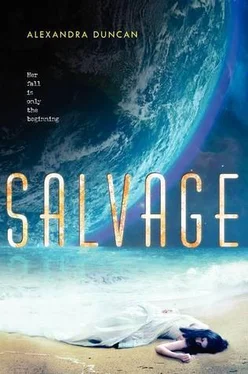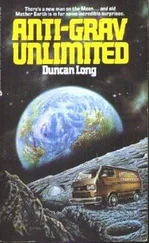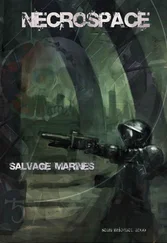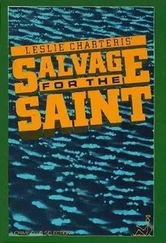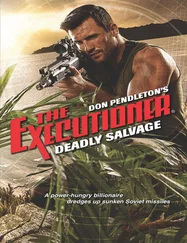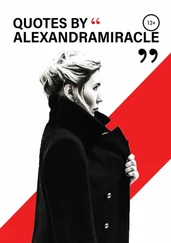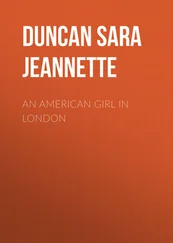“What if you come on some trouble?” She doesn’t look up at me. “What if Turrut or . . . or the captain catches you out alone?”
I stop in my tracks. Nan almost bumps into us.
“Llell,” I say, pulling all the sternness of Modrie Reller’s voice into my own. “I don’t need you to tell me what’s proper. Are you forgetting my place?”
Llell falls quiet. She scratches the inside arch of her foot with her big toe.
“If you and Nan and the others would rise with me, I wouldn’t need to walk out alone, would I?”
Llell makes a face but doesn’t say anything.
“How can we protect one another’s honor if you’re still asleep?”
Llell stares at the floor. “Right so,” she says quietly.
A twinge of remorse nips at me. I want to reach out and squeeze her hand, as we did when we were younger and neither of us knew what our stations meant. But I am the so girl. I lift my head and continue along the corridor.
The warm, heavy stink of offal, synthetic hay, and animal bodies hits us as I activate the doors to the livestock bay. I leave the chickens to Llell. They’re hateful and like to nip, but she doesn’t mind them so much as the rest of us. I let Nan wander off in search of the cats, even though Llell and I both know she has her pockets full of leftover bean cake from the kitchens and she’s going to spoil them for mousing. I start on the goats.
I unhook the coaxer from its peg on the bulkhead wall and lead the first of the nanny goats into the outer paddock for milking. Above me, Llell activates the pneumatic lift and rides it up to the chicken coop, filling the bay with an awful grinding sound. She coo-coos softly to the birds as it comes to a stop. I strap the first goat into the coaxer, notch the dial to the yellow setting in the middle, and go back into the paddock for another goat to milk by hand while the coaxer does its work on the first. The second one is testy. She tries to step on my feet and kick over the pail as I pull milk from her udders, but I’ve been milking every day since I was a smallgirl near five turns. I know all the goats’ tricks. I hitch in her lead and hold her back left leg still.
Beside me, the coaxer choke-rattle-grinds, and the first goat bleats in fright. She tries to bolt, but the heavy machinery weighs her down. She rears. I jump up and pull the milking pail out of the way before the second goat can bolt and knock it over. The tang of too-hot metal floods the air.
“Hshhh, hshhh.” I lay a calming hand on the goat’s neck and unstrap her. The second she’s free, she runs for the far side of the paddock in a kick of hay, flaps her ears, and stamps in annoyance. I tap the regulator face on the coaxer’s side. It’s stuck on the low setting, and trying to rev itself to catch up. I check over both shoulders to see if Llell or Nan is lurking behind me. No one. I’m alone.
I pop off the faceplate. The coaxer’s old, some turns older than me, and sometimes its belts slip. The last time this happened, we had to turn it in at the Fixes’ workshop and it took deciturns to get it back, since the coaxer’s not Priority. But now no one’s watching, so I can try one of the fixes I learned from my friend Soli at the runend meet some five turns past. I slide the faceplate away. The interlocking cogs in the coaxer’s innards have been stripped, ground completely smooth.
“No. Oh, no.” I groan softly. I could fix it, but for that I’d need parts. And if I go to the requisitions master and tell him what I need, he’ll ask how I know what the fix is. And then it’ll come out someone’s taught me fixes. So girl or no, that’s hardly proper.
Nan scurries up, brushing crumbs from her hands. I snap the faceplate back on the coaxer and drop it into my lap in one smooth movement.
“It’s bust again?” Nan asks.
I nod. “I’ll take it by the Fixes after we finish.” I have no choice.
“How many more?” she asks.
“Thirteen.” I point to the pen of waiting goats.
Nan leads out another goat, a spotted one, and we both bend our heads over our work. It’s some peaceful, the rattle of milk as it hits the pail, my knees on the warm hay, knowing Nan is beside me and the ship is extending its solar arms to the sun to power up the grids and wake everyone for the last day of our journey. I’m thinking on how maybe I could gut some of the other machines in the junk locker for salvage parts, slip around the Fixes, and get our coaxer working again. . . .
“Ava,” Nan whispers.
I glance up and see her eyes locked somewhere behind me. I look over my shoulder. Modrie Reller has crossed the gangway. She’s bearing down on us like a hawkship, her long, gray, copper-shot hair coiled in braids at the base of her skull and her fan swinging from a cord around her wrist. She moves quick and practiced, despite the round of pregnancy at her waist, like a caravel accustomed to sailing under heavy cargo. Iri, my great-grandfather’s youngest widow and Modrie Reller’s constant shadow, trails in her wake. I jump to my feet and brush the hay from my skirts.
The pneumatic lift rumbles above us. Llell is coming down, a crate of fresh brown eggs in her arms. The noise from the lift drowns out any hope of talk, but the question is all over her face. What’s happening?
“Ava,” Modrie Reller says. Her words are clear, even over the lift’s gears. “Come with us.”
I look back at Llell and Nan. They both stare openly at me, straw and muck all over their skirts. I brush myself down one last time, step out of the pen, and let the gate’s latch fall closed behind me.
Modrie Reller doesn’t speak as she leads the way through the halls. Iri and I trail in her wake with our heads bent modestly, so we don’t look on the faces of any men by mistake. We pass the open arched doorways of the main corridor, the kitchens, the hydroponic gardens, the men mixing a slurry of paste, dung, and fabric remnants for paper, the dyegirls heating urine and water in vats while the older women bend over their weaving. Along the way, the caged canaries stand sentry for bad matter in the air. We move past the men’s training room with its walking machines and pressure chamber for keeping them strong enough to bear the Earth’s weight, and through the sleeping quarters, now almost empty. Modrie Reller pushes aside a heavy woven tapestry picturing Saeleas, haloed in copper-point stars.
We duck into the tiled cleanroom on the other side, where Kamak sits rubbing oil into the stretched skin of her stomach. She is pregnant with her third child. Modrie Reller gives her a tight smile and a nod as we bustle past. We cut through the narrow service corridors and stop short in a small room with a utility sink, its metal drain limed with age. Iri pulls the door shut behind us.
Now I know why we’re here. They’re going to dye my hair.
When I was born, my hair was auburn like my mother’s, not too far from my crewemates’ heads of amber and rust. But it darkened as I grew, until it was black like a canary’s eye, and the oldgirls started talking. They said it was the curse, the bad matter left on us when my grandmother married a man from Earth, a visiting so doctor who took my grandmother for his secondwife. Crewes take such marriages every few decades, like a tonic. It brings new blood into our line. The so doctor was good, the oldgirls say, took care of my grandmother and the girl that came from their union, my own mother.
But when he passed, the so doctor’s daughter by his firstwife came meddling, sending messages and even booking passage to the skyport to find us. I was only a smallgirl then, but I remember the sight of her stalking down the gangways beside our old captain, my great-grandfather Harrah, her head swathed in dark cloth and her arms covered. The deep brown of her face, brown as paper, looking out at us. How tall she was, the same height as my great-grandfather, and how she stared into everyone’s eyes—even the men—as if she were looking for someone. She walked so sure and steady, as if she weren’t tracking the Earth’s taint through our ship.
Читать дальше
